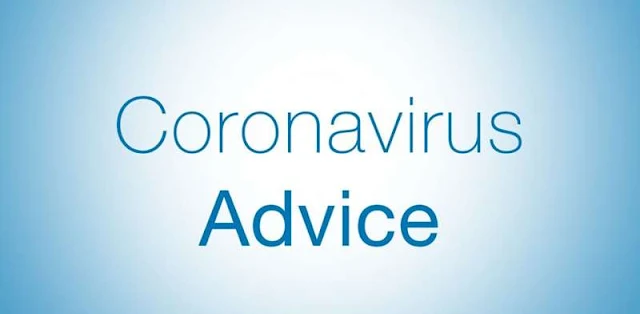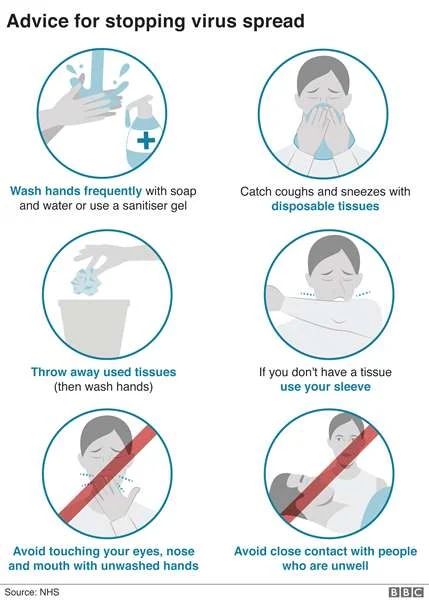New coronavirus (COVID-19): advice for the general public
Essential protective measures against the novel coronavirus.
Keep up to date with the latest information on the COVID-19 outbreak, available on the WHO website and from national and local public health authorities.
COVID-19 continues to affect mainly the population of China, although outbreaks are occurring in other countries.
Most infected people have mild symptoms and recover, but others may have a more severe form.
Take care of your health and protect others by following these tips:
- Wash your hands frequently
- Wash hands frequently with a hydro-alcoholic solution or soap and water.
What's that for? Washing your hands with a hydro-alcoholic solution or soap and water kills the virus if it is present on your hands.
- Avoid close contact
- Maintain a distance of at least 1 meter from other people, especially if they are coughing, sneezing or have a fever.
Why should I do this? When a person infected with a respiratory virus, such as VIDOC-19, coughs or sneezes, they project small droplets containing the virus. If you are too close, you can inhale the virus.
- Avoid touching your eyes, nose, and mouth.
Why should I avoid touching my eyes, nose, and mouth? Hands are in contact with many surfaces that may be contaminated with the virus.
If you touch your eyes, nose or mouth, you may come into contact with the virus on those surfaces.
Follow respiratory hygiene rules
Cover your mouth and nose with the crease of your elbow or with a handkerchief if you cough or sneeze - dispose of the handkerchief immediately afterward in a closed rubbish bin and wash your hands with a hydro-alcoholic solution or soap and water.
Why should I do this? Covering your mouth and nose when coughing or sneezing helps prevent the spread of viruses and other pathogens.
Stay informed and follow your doctor's advice.
Keep abreast of the latest developments regarding VIDOC-19
Follow the advice of your doctor, national and local health authorities or your employer on how to protect yourself and others from VIDOC-19.Why? National and local authorities have the most up-to-date information about whether or not VIDC-19 is spreading in your area.
They are in the best position to explain what people in your area should do to protect themselves.
Protective measures for people who are or have recently been (within the last 14 days) in areas where VIDOC-19 is spreading
Follow the tips above
If you begin to feel unwell, even if you have only mild symptoms such as headaches and a mild runny nose, stay home until you are well.Why should I stay at home? Avoiding contact with other people and avoiding going to health care facilities will allow these facilities to function more effectively and will protect you and others from VIDOC-19 and other viral diseases.
If you have a fever, cough or difficulty breathing, see a doctor right away, as it may be a respiratory infection or other serious illness.
Call your doctor and tell him or her if you have recently traveled or been in contact with travelers.
Why? If you call your doctor, he or she will be able to quickly refer you to the most appropriate health care facility. This will also protect you and prevent the spread of VIDOC-19 and other viral diseases.
If you develop a fever, cough or difficulty breathing, seek medical attention immediately, as it may be a respiratory infection or other serious condition.
Call your doctor and tell him or her if you have recently traveled or been in contact with travelers. Why? If you call your doctor, he or she will be able to quickly refer you to the most appropriate health care facility.
This will also protect you and prevent the spread of VIDOC-19 and other viral diseases.
The WHO responds to you
A: Yes, you can contract respiratory viruses by shaking hands with someone and then touching your eyes, nose or mouth. Wave with a wave of the hand or head, or by bowing.
Q: How do I greet someone to avoid catching the new coronavirus?
A: The safest way to greet someone to prevent VID19 is to avoid physical contact. You can greet with a nod or a wave of the hand or head, or by bowing.
Q: Does wearing rubber gloves in public places prevent infection with the new coronavirus?
A: No. Washing your hands regularly provides better protection against VIDC-19 than wearing rubber gloves.
The virus can be found on the gloves and there is a risk of contamination if you touch your face with the gloves.
Coping with stress during the COVID-19 coronavirus outbreak.
Helping children cope with stress during the outbreak of coronavirus disease (COVID-19)
Stress can induce different reactions in children. For example, they may become more clingy, anxious, withdrawn, angry or agitated, or suffer from bedwetting, among other things.Respond sympathetically to your children's reactions, listen to their concerns and give them even more love and attention.
In difficult times, children need the love and attention of adults. Give them more time and attention.
Remember to listen to your children. Talk to them in a gentle way and reassure them.
If possible, give them a chance to play and relax.
Try to keep children close to their parents and family and avoid separating them from their caregivers as much as possible. In the event of separation (e.g. for hospitalisation), ensure regular contact (e.g. by telephone) and reassurance.
Keep your habits and schedules as much as possible or make sure you introduce new ones in a new environment, especially for school and learning, but also for safe play and relaxation.
Present the facts about what is happening, explain what is happening now and give them clear information on how to reduce the risk of infection by the disease, adapting your speech to their age so that they can understand.
It also involves communicating information in a reassuring way about what might happen (for example, a family member or the child himself or herself might not feel well and need to go to the hospital for a while so that the doctors can help him or she get better).
Be prepared to deal with the coronavirus
Source: World Health Organization " WHO "
Name
Health


